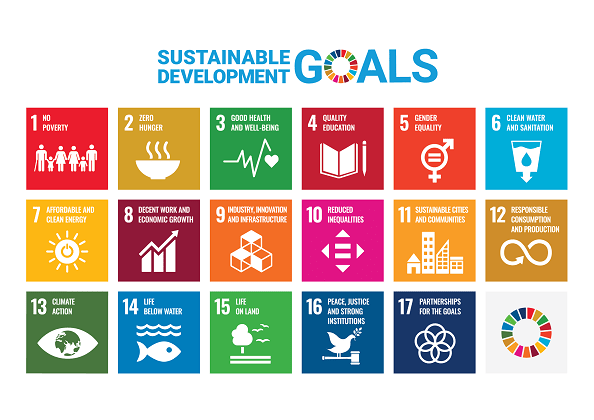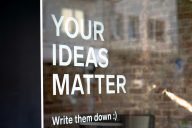Skills mismatch. Skills gap. Skills needs. Reskilling. Upskilling. Sound familiar?
Indeed, the revolution of skills needs is transforming the job market in Finland and globally. The Future of Jobs report by the World Economic Forum states that on average, companies estimate that around 40 percent of workers will require reskilling of six months or less and 94 percent of business leaders expect employees to learn new skills on the job (1). What future skills should we all then prepare for?
Alongside digitalisation, another underlying development sets the targets and realities for organisations across sectors, and thereby also for professionals. An all-encompassing shift towards sustainability is urgently needed. As the Future of Jobs report puts it, we have reached our defining moment: what we decide and choose today will define the course of entire generations’ lives and livelihoods (2).
This is why the know-how on sustainable development has topped several skills rankings in the past few years, in Finland and globally. For you as a professional, it means that you need to invest in your sustainability skills to be successful now and in the future.
Thinking outside the green box — what do we actually mean by sustainability?
When we talk about sustainability, it is easy to be stuck on the green track: to only pay attention to environmental or ecological sustainability.
Naturally, it goes without saying: no one living in the 2020’s can ignore the overwhelming impact of climate change. Clean water and air, biodiversity, environmental migration, extreme weather conditions, energy efficiency and so on; environmental issues have become part of our regular media coverage, daily discussions and, to varying degrees, our everyday realities. Even those who deny the very existence of climate change are aware of the importance given to the phenomenon.
Besides environmental concerns, however, sustainable development in its broad sense requires action also on other important aspects: the economic and the social.
The 2030 Agenda for Sustainable Development, adopted by all member states in the United Nations, provides “a shared blueprint for peace and prosperity for people and the planet, now and into the future”. The agenda thus incorporates all three — the environmental, economic and social — dimensions into our action plan. In other words, for a better future, we need to secure the wellbeing of our planet, our people and our economies, and they are all interdependent. (3)
The 17 globally agreed UN Sustainable Development Goals shed light on the all-embracing nature of sustainable action. To secure sustainable development, we all need to re-evaluate a wide range of our personal, professional and political choices.

Sustainability versus profit and performance — does one rule out the other?
Yes, sustainability is rather a complex concept requiring critical, long-term thinking. Why would organisations and companies then want to commit to sustainability?
The answer is simple: it brings value, better performance and profits.
- Consumers and customers are increasingly aware of responsible consumption.
- The public is also more and more vocal about sustainability: bad choices get immediate reactions on social media and generate boycotts.
- Investors show increasing interest in sustainable investing.
- Employees want to work for a purpose and for a responsible employer, bringing a positive impact on the world. (4, 5, 6)
In short, if you lose your customers, investors and employees for poor strategy, it is obviously not good for your business. By contrast, investing in sustainability can actually attract the best talent and also open new avenues for business.
The pay-off seems to be getting even higher with younger generations. The Deloitte Global 2021 Millennial and Gen Z Survey shows that millennials and the subsequent generation Z are very much concerned about the environment, discrimination and inequality. This impacts their consumer and other free time choices as well as professional ones. (7)
Strategic level of sustainability: align your focus
The data on the benefits of committing to sustainability is why companies have started to take sustainable development seriously and to also communicate it. Naturally, many organisations also genuinely see sustainability as an integral part of their values. For you, the abundant sustainability strategies and reports as well as value statements can be useful tools for developing yourself: they show you what you need to focus on.
Globally, 64 percent of major international companies publicly disclosed their carbon targets this year. In the USA, 90 percent of companies published a sustainability report in 2019. (8)
Also in Finland, two thirds of companies recognise that sustainable development, corporate responsibility, climate change and circular economy are of great or growing importance for business (9). In fact, six Finnish companies are even ranked in the Global 100 most sustainable corporations in the world in 2020 (10). That is a lot considering the size of the country. And, note well: all of these corporations are also in the top 20 best performing Finnish companies by revenue (11). When exploring sustainability, their strategies seem well worth checking.
Sustainable development cannot be a strategy priority only for businesses, though. All types of organisations need to get onboard. Luckily, a wide variety of examples keep on popping up similarly to businesses. For instance, Metropolia has recently published its sustainability roadmap and the City of Helsinki has invested in a sustainable strategy already for some years.
Strategies matter, as they set the targets for action in the context of your organisation and your field. Change, however, also needs makers. You, me, us.
Translating sustainability to job market expectations
Now this is the moment to stop to think about your competences and skills. Where are you at in terms of sustainability thinking? Where do you want to get to? Are you equipped with the needed skills?
Just the so-called green economy alone is a growing business and job market. A report by the International Labor Organization (ILO) estimates that, by 2030, 24 million jobs worldwide could be created by the green economy alone. (12)
Yet, and perhaps more importantly, data pulled out from LinkedIn shows that in reality there is no such thing as a single “green industry” anymore. “Green jobs” are out there across a wide range of obvious and not so obvious industries. Employers increasingly expect all staff members to be actively incorporating sustainable practices into their work. (13)
The same trend applies to Finland as well. The Competences and Skills in 2035 report by the National Forum for Skills Anticipation maps 30 sectors and their future skills needs. Alongside competences related to change management, digitalisation and customer-oriented development, knowledge of sustainable development is highlighted across sector groups. (14) A recent study by Technology Finland also identifies the need for several skills related to sustainability in the Finnish technology industry, including e.g. knowledge of circular economy, inclusion and low-carbon practices (15).
How to get started as a professional?
Sustainable development can seem overwhelming a topic, but we can all re-orientate the way we operate and think. This is important for a sustainable future, but it will also bring added value and a competitive advantage to your organisation and to you as a professional.
You can start by considering the following:
- Understand sustainability. Make sure that you know what all dimensions of sustainability mean in general, and more importantly, in your field of work and your profession. Check the Deck of Skills Cards (PDF) for sector specific needs in Finland.
- Open yourself for opportunities. Pay attention to good examples of sustainability, successful organisations and winning innovations around you and use them for learning more. Follow the discussion and research on global megatrends and be curious. What new innovations are out there just waiting to be invented?
- Pay attention to people. Evaluate your customer group, your staff, your visiting specialists, your board and the social reality in which you operate. How diverse are they? Are you bringing added value to local communities? Does your product or service work for all relevant customer groups if you consider for example age, gender, sexual orientation, culture, social background and geographical location? What potential new market areas and target groups could there be?
- Lead by example. Are you in a leading position in your team or organisation? Your role is hugely important for the change: learn, take responsibility, set goals, show example and communicate.
- Train your creativity, long-term thinking and strategy talk. Investing in sustainability might not bring in value immediately. You need to be creative and consider what is possible in the long run. Be patient and consistent and communicate. Also, keep on learning more. Listen to podcasts and talks, read articles, observe, be inspired and stop to think as well. When that idea comes along, prepare to give field-specific justifications, use examples and calculate the return of investment.
- Purchase, subcontract and commission wisely. When purchasing services or products or making contracts with suppliers, check their background. Are they produced sustainably and responsibly? Are you maintaining inequality and inapproapriate practices or supporting equity and fairness?
- Re-visit your daily practices. What do you really need to print? Which (technological) solutions reduce the use of paper and other resources or the total hours of commuting? Make also sure that your office set-up works energy efficiently, be it in the office or at home.
For more food for thought and insights on the Finnish context, explore for example the publications by Sitra, Demos Helsinki and Inklusiiv. For ideas on developing your professional competence, read the Harvard Business School Online blog 8 Sustainability Skills for Working Professionals by Catherine Cote.
Mahatma Gandhi said it. Be the change you wish to see in this world. Now is a good time to start.
Sources:
- The Future of Jobs report 2020. World Economic Forum. Executive summary. Viewed on 18 October 2021.
- The Future of Jobs report 2020. World Economic Forum. Preface. Viewed on 18 October 2021.
- The 2030 Agenda for Sustainable Developmen. The United Nations. Viewed on 21 October 2021.
- Gast, A. & al. 2020. Purpose: Shifting from why to how. McKinsey Quarterly. Published on 22 April 2020.
- Lipponen, K. & Mäkelä, T. (eds.) 2019. Vastuullisuuden suunnannäyttäjät: Käytännön työkaluja ja esimerkkejä yritysvastuun johtamiseen (PDF). Confederation of Finnish Industries.
- Chladek, N. 2019. Why You Need Sustainability in Your Business Strategy. Harvard Business School Online blog. Published on 6 Novemeber 2019.
- The Deloitte Global 2021 Millennial and Gen Z Survey. Deloitte. Viewed on 21 October 2021.
- Cote, C. 2021. 8 Sustainability skills for working professionals. Harvard Business School Online blog. Published 7 October 2021.
- Lipponen, K. & Mäkelä, T. (eds.) 2019.
- 2020 Global 100 results. Corporate Knights. Published on 21 January 2020.
- Talouselämä 500 -selvitys. Talouselämä. Published on 4 June 2021.
- World Employment and Social Outlook 2018. International Labour Organization. Published on 14 May 2018.
- Kimbrough, K. 2021. These are the sectors where green jobs are growing in demand. World Economic Forum. Sustainable Development Impact Summit. Published on 23 September 2021.
- Osaaminen 2035. National Forum for Skills Anticipation. The Finnish National Agency for Education. Raportit ja selvitykset 2019:3. Summary available in English. 2019.
- Osaamispulssi. Technology Finland. Viewed on 22 October 2021.











No comments